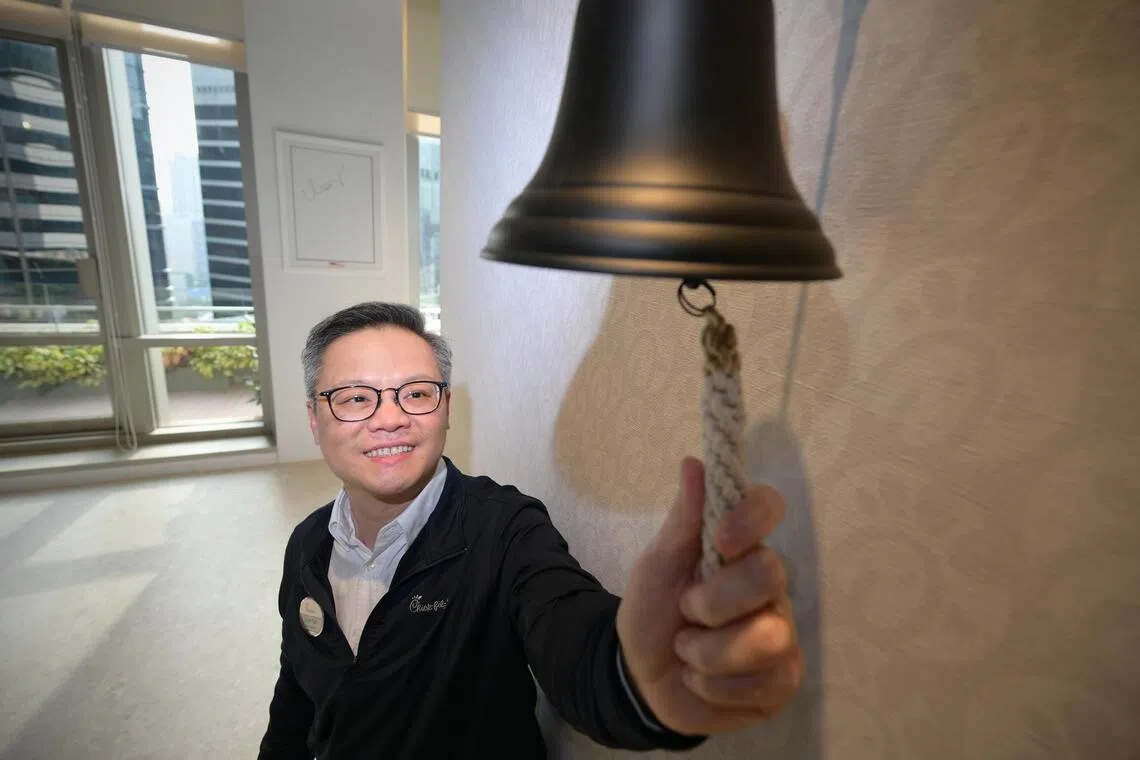Chick-fil-A Singapore’s owner-operator wants it to be the country’s most loved chicken restaurant
Sign up now: Weekly recommendations for the best eats in town

Mr Chyn Koh is the owner-operator of Singapore's first Chick-fil-A outlet, set to open in late 2025.
ST PHOTO: NG SOR LUAN
Follow topic:
SINGAPORE – For many of Chick-fil-A’s most ardent devotees, it is not so much a fast-food restaurant as a way of life.
Fans grow up on the American chain’s fried chicken sandwiches, get their first taste of employment navigating its deep fryers and wind their way through its ranks until finally, they reap the rewards of long service by calling the shots at an outlet of their own.
Singaporean Chyn Koh’s journey with the brand was somewhat more compressed. He took his first bite of Chick-fil-A in May in Singapore. By that time, he had already committed his future to the company and undergone a seven-month interview process in a bid to become the owner-operator of its first Asian outlet.
Having emerged victorious, he was suddenly struck by doubt. This was, after all, a sandwich made from chicken breast – often perceived by Singaporeans as the inferior cut. How good could it possibly be?
“My expectations had been built up a lot and I was so nervous,” says the 49-year-old. “But I took my first bite and then, boom. How can a piece of chicken with two buns and two pickles taste so good? It’s like one plus one equals three.”
Mr Koh was an instant fan and hopes that Singaporeans will be too when his restaurant starts selling chicken sandwiches and waffle fries in late 2025. Though popular market staples like the McSpicy from McDonald’s are made with thigh meat, he asks diners not to write chicken breast off just yet.
“As long as the meat is tender, I actually prefer chicken breast,” he says. “There’s just more bite to it. And when you chew it, it has a lot more substance. It’s just more satisfying.”

The American chain is known for its Original Chick-fil-A Chicken Sandwich and Waffle Potato Fries.
PHOTO: CHICK-FIL-A
The fast-food veteran, who previously spent 17 years as a franchisee for American sandwich chain Subway, sees this as his chance to demolish typical fast-food stereotypes.
His goals are threefold: to prioritise reputational excellence over pure sales; to welcome guests of all backgrounds – the restaurant will not use pork, though it does not yet plan to apply for halal certification; and to cement Chick-fil-A’s position as Singapore’s best-loved chicken restaurant.
In short, he wants to serve food that does not taste or feel like fast food.
That means fresh chicken, filleted and breaded by hand. As well as friendly service, provided by staff who refill your drink without being asked – or who, when encountering a student treating his friends to burgers, perhaps, supplements the meal with a round of ice cream on the house.
Therein, he thinks, lies the nobility of service.
“Some owner-operators will say they want to change lives. That might be a bit of a stretch for me, but I feel that we absolutely have the ability to make someone’s day in a restaurant,” says Mr Koh.
He declined to specify how much he invested in the outlet, apart from a $15,000 franchise fee.

Mr Chyn Koh has yet to reveal when or where exactly his restaurant will open.
ST PHOTO: NG SOR LUAN
It was this ethos of second-mile service, which the brand famously espouses, that inspired him to apply for the job of owner-operator in October 2024, despite knowing little about Chick-fil-A.
At the time, he was operating six Subway outlets and running on a relatively stable schedule. “But I started to feel like I was losing momentum,” he says. “One day, I was driving, and I thought, ‘This can’t be it, right? There’s got to be something else.’”
So, instead of cruising for the next 10 to 15 years, he decided to take the plunge and devote his last “20 good years left of energy” to doing something new and spectacular to inspire his 13-year-old son.
“What I do matters more than what I say. I want him to see me take on this huge thing, maybe struggle with it and make some mistakes, then come out successful on the other side. That’s how I hope I’ll get some drive into him.”

Chick-fil-A Singapore's menu will feature its chicken sandwich and spicy deluxe sandwich.
PHOTO: ST FILE
But sketching out his ideals is one thing. Weaving it into the fabric of the workplace is easier said than done.
And, as the man spearheading the brand’s first foray into Asia, he is starting to feel the weight of his responsibilities. “I try not to think about it,” he says with a laugh. “The pressure is on, yes, but I’m really excited to build my team at the same time.”
Mr Koh has assembled his core trio – director of operations, human resource manager and back-of-house manager – and is looking to fill the other 60 to 80 slots on his team with energetic youngsters and hospitality enthusiasts.
“Our principle is that the attitude will always win over the experience,” he says, joking that management and full-time staff can expect to be “put through the wringer” to make sure they really want the job.
His family is coming on board too. His mother, 75, whom he describes as “a little dynamo”, will handle produce, while his 78-year-old father-in-law might helm the front of house. He is hoping to rope his son in as a team member in a couple of years.
“We’re going to hire so many youngsters. For a lot of them, this might be their first job and, hopefully, they’ll bring their friends,” he says. “I want them to see that their work matters, not just because they’re doing a fast-food service job, but their work matters if they pursue service through the lens of hospitality. If they can see that, then they feel that there is purpose and nobility in service.”
He expects the pay and perks to attract potential employees too. Part-time staff will make $14 an hour – higher than the local industry standard of $7 to $12 an hour, according to employer review platform Glassdoor – while perks include leadership development and a care fund which managers can disburse at their discretion to staff.
He is also setting aside resources to help the community. Plans include sponsorships or research opportunities for schools, as well as staff meals for cleaners and security guards in the neighbourhood.
Mr Koh, who says he has always had a soft spot for the underdogs, adds: “I want them to know that this is a place they can hang out at. We’re going to take care of you.”


